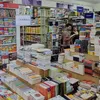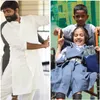30 artists, 250 artworks: Art Bengaluru Collective wraps up its fifth exhibition
In this photo essay from Karnataka Chitrakala Parishath, we share exhibition highlights and artist insights.
Launched in 2014, PhotoSparks is a weekly feature from YourStory, with photographs that celebrate the spirit of creativity and innovation. In the earlier 785 posts, we featured an art festival, cartoon gallery. world music festival, telecom expo, millets fair, climate change expo, wildlife conference, startup festival, Diwali rangoli, and jazz festival.
This month, the Art Bengaluru Collective (ABC) wrapped up its fifth show, titled ABC 5.0. Held at Karnataka Chitrakala Parishath, the exhibited works span a wide range of styles including traditional paintings, landscapes, realism, minimalism, portraits, charcoal, and sketches.

ABC was launched in 2022 by journalist-artist Rasheed Kappan and painter-theatreperson Ranji David. The artworks are intended to be diverse, appealing and affordable, with earlier editions held at the Rangoli Metro Art Centre, MG Road.
“ABC has focused on building a community of artists across genres and themes. Our emphasis is on visual dynamics, diversity of styles, consistency within the allotted space, composition, and overall aesthetic appeal,” Rasheed Kappan tells YourStory.
ABC has set up a WhatsApp group to make announcements, discuss art, and boost art community bonding. “A separate group of participating artists is created for every show for better coordination and focus,” Ranji David explains.

Rasheed Kappan and Ranji David at exhibition inauguration
Many physical meetups, art camps and talks have been held, with the total number of artists now at 150. “They dwell deeper into the making of art, art appreciation and promotion,” he adds. The overall spirit has been collaborative and interactive.
“Art is a medium of expression and a celebration of life with a non-judgmental attitude. Art transcends boundaries of interpretation and unleashes the freedom to explore meanings beyond the visual,” Kappan describes.
He sees art as a way to capture life in its myriad forms. “Art injects a purpose, while blending aesthetics with reality. Art is also about the craft, the skillset of the artist, and the expression of experience,” he adds.

Somya Tewari
“Art is a language, a way to not just express oneself but have a two-way communication. I use this language to talk to myself and the world,” says artist-designer Somya Tewari.
Art is also about experiencing and acknowledging the world around in its dailyness. “All my work, whether paintings or poetry, is deeply inspired either by this desire to have a dialogue, or to pay homage to the ordinary moments by sharing them with others via art,” she affirms.
Tewari prepared artworks titled Sky is the only shelter, Nature is always talking, and River never sleeps. “These works are an attempt to pay my rites to the obvious yet subtle existence of nature,” she explains.

Gautam Bansal
Such appreciation of nature often goes unnoticed in the hustle-bustle of daily life. “These artworks are intended to invoke wonder, curiousity and regard for nature’s silent vastness, beauty and magic,” Tewari says.
Charcoal artist Gautam Bansal prepared a series of artworks along with some mixed-media pieces. “My subjects varied from nature to figuratives and emotions, with depictions of dance and animals,” he describes.
“The use of charcoal allowed me to explore depth and texture. The mixed-media pieces added a layer of complexity and dimension,” he says.

The artistic journey is full of ups and downs. “An artist has to create art in all its myriad forms and genres, which involves exploring, experimenting, learning and failing,” David observes.
“To move ahead in their craft, artists can take comments and reviews from senior artists, critics and analysts. This is possible only when the art is showcased in exhibitions,” he says.
“It can be very easy, more so in the way the world approaches failure and mistakes, to feel disheartened and hopeless very quickly,” Tewari observes.

She suggests seeing so-called failures as an opportunity to explore further and go deeper into one’s artistic expression. “The most effective way to deal with low periods is to stay patient and loyal to one’s art and practice with more intention,” she describes.
“Sooner or later, a new path emerges. Our art evolves with us,” Tewari affirms.
Kappan and David call for more art appreciation in society. “There is a need to increase the availability, accessibility and affordability of art courses,” they suggest.

Collaborations with the corporate sector can help art courses lead to viable and sustainable careers. “Galleries and other art platforms should be democratised, making displays more affordable and accessible to amateur and aspiring artists,” they add.
The cofounders say they are pleased with the exhibition feedback. “Many appreciated the quality, ambience, and space for artist collaborations. There were suggestions on bringing in more art investors, art buyers, and partnerships with galleries,” they enthuse.
ABC is contemplating holding its exhibition every quarter. Other plans are for premium shows, installations, live art sessions, and art community bonding initiatives.

Viewers of Bansal’s works seemed captivated by the intricate details and textures in both the charcoal and mixed-media pieces. “Some visitors were particularly moved by the social messages conveyed through the artwork, such as connection with nature,” he recalls.
Tewari observed a wide range of responses to her paintings. “Some in the audience spent time just gazing and thinking. Others wanted to know the locations and stories behind each of them,” she recalls.
Some took pictures and talked about their experiences with nature. “The piece titled Nature is always talking was the most commonly-loved piece, it reminded people of their home, childhood, or of some relaxed time from the past. Exhibiting is always a grounding experience,” she exclaims.

The curators and artists offer suggestions for aspiring artists as well. “Continue to work on the basics and foundations, and experiment. Create and exhibit on a regular basis,” Kappan and David advise.
“Have an open mind while creating art, don’t judge. Art is consumed without limits,” they add. Community involvement and engagement are important as well.
Bansal offers a range of tips for artists to use social media for broader visibility and audience connections. “Consistency, quality and engagement are key here,” he suggests.

“Post regularly to keep your audience engaged. Ensure that the photos of your work are well-lit and high-resolution to best showcase the details. Respond to comments, participate in discussions, and show appreciation for your followers’ support,” he advises.
“Stay honest to yourself and to your relationship with art. Approach art with the intention to explore fearlessly and express truthfully,” Tewari advises.
“Art is meant to expand your vision and not restrict it. Spend time with art and sometimes let it lead you into worlds and expressions you probably did not imagine. Trust the journey,” Tewari signs off.
Now what have you done today to pause in your busy schedule and harness your creative side for a better world?










(All photographs were taken by Madanmohan Rao on location at the exhibition.)












